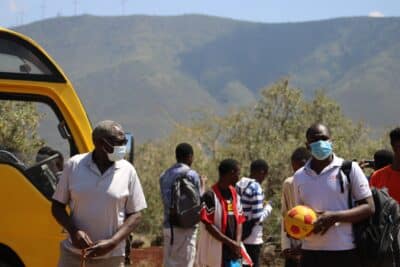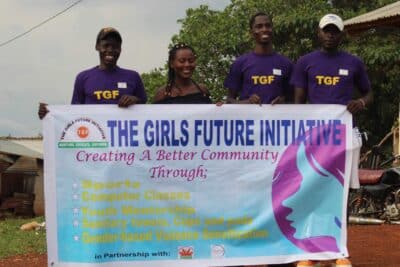In 2003, the United Nations declared sport to be one of the many means to promote education, health, development and peace. And with good reason, because sport is more than a short-term pastime – sport can change the lives of many children and young people in difficult situations sustainably for the better.

Success drives motivation - even outside the playing field
There is hardly anything more motivating than a taste of success. Anyone who does sport regularly knows this from personal experience. Seeing how you can run a few hundred meters farther, lift a few handfuls more or jump a few centimeters further after each training session – this is exactly what keeps us motivated to stay on top and never give up. Experiencing that you are in control of your own success, that you are capable of becoming better, is a valuable insight. It can be applied to almost all areas of life, especially education and professional life. Children who realize that they can become better through training are more motivated to look to their future – and also perform better at school. .
The sports club as anchor
A lot of children and young people in crisis areas lack a solid structure in their daily lives. If school lessons can only take place sporadically due to a lack of teachers or attacks, these young people need a different fixed point in their daily lives. Routine club membership can make a big difference. Regular meetings and exchanges with like-minded people create a feeling of stability and cohesion that is often lost in their otherwise difficult life situation.

Together we can achieve more
A common goal, especially in team sports, creates a strong team spirit and often even deep friendships. The experience of achieving a common goal as a group is a great bonding element for children and young people. Cheering for one’ s team creates cohesion and a feeling of community – even when former rivals are in one’s own team. At the same time, the young athletes learn how to solve private conflicts alternatively: by meeting at eye level with respect. There is nothing more non-sportsmanlike than violence – when it comes into play, it is usually severely punished. In sporting competitions, children and young people learn to resolve conflicts and rivalries without the use of violence and can transfer this to other areas of life.
Self-confidence for success
Having negative thoughts and a low self-esteem can quickly lead people into a downward spiral of negativity. Through sport self-esteem can be built up quickly and effectively. Not only is the self-perception of one’s body strengthened – aspects such as motivation, friendships and stability also contribute to greater self-confidence. Thus the vicious circle can change into a positive upward spiral: Those who do sport become more self-confident. And those who go into training with great self-confidence automatically have more success.

Sport disrupts conservative gender roles
In more traditional and conservative communities, girls often find it particularly difficult to participate in social life – even in sports, which is often still considered a “male domain”. However, if girls are given the chance to participate in sports, a whole new world often opens up for them. Not only is the self-confidence of the female participants and their integration into society strengthened. If the family is made aware of their daughter’s sporting success, for example in competitions, they may have far more confidence in her in other areas than before. Although all the benefits of sport apply to all young people in difficult situations, girls benefit most from it.
We at Abasha firmly believe that sports is the key to a successful and happy future for children and young people in crisis situations. As Kofi Annan said in his time as Secretary-General of the United Nations: “Without sport, the world would be a worse place”. How very right he was.
Sources:
Bundesministerium für wirtschaftliche Zusammenarbeit und Entwicklung (Hrsg.) (2015), “Die Rolle des Sports in der deutschen Entwicklungszusammenarbeit”, http://www.bmz.de/en/publications/languages/german/Materialie268_sport_ez.pdf, letzter Zugriff 17.04.2020
care.de (o.d.), “Durch Sport in eine bessere Zukunft”, https://www.care.de/care-hilfe/themen/sport-fuer-entwicklung, letzter Zugriff 17.04.2020
Geis-Thöne, W., & Schüler, R. M. (2019), „Lebenslagen und Kompetenzentwicklung von Grundschulkindern“, IW-Trends-Vierteljahresschrift zur empirischen Wirtschaftsforschung, https://www.iwkoeln.de/fileadmin/user_upload/Studien/IW-Trends/PDF/2019/IW-Trends_2019-02-06_Grundschulkinder.pdf, letzter Zugriff 23.04.2020
GIZ (o.d.), „Friedensentwicklung und Gewaltprävention durch Sport“, https://www.giz.de/de/weltweit/59683.html, letzter Zugriff 23.04.2020
Innenministerium des Landes Nordrhein-Westfalen, LandesSportBund NRW e.V. (Hrsg.) (2009), „Wir sind dabei! – Mädchen und Frauen mit Zuwanderungsgeschichte im Sport“, http://pl.zuhause-im-kreis-soest.de/integration/downloads/sport_zuwanderung09.pdf, letzter Zugriff 17.04.2020
The United Nations Children’s Fund (UNICEF) (Hrsg.) (2004), “Sport Recreation and Play”, https://www.unicef.org/publications/files/5571_SPORT_EN.pdf, letzter Zugriff 17.04.2020



